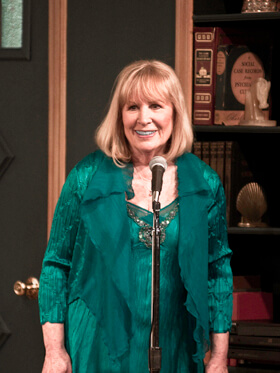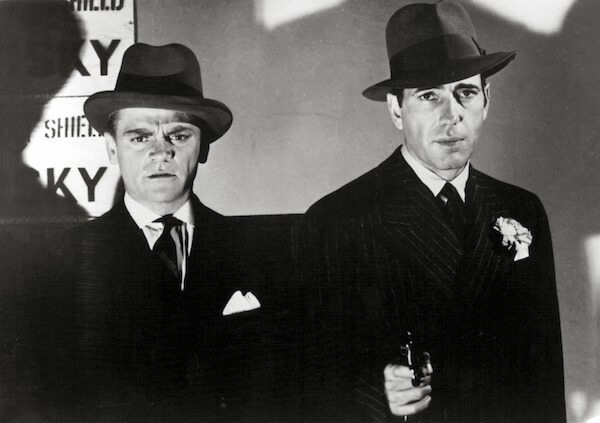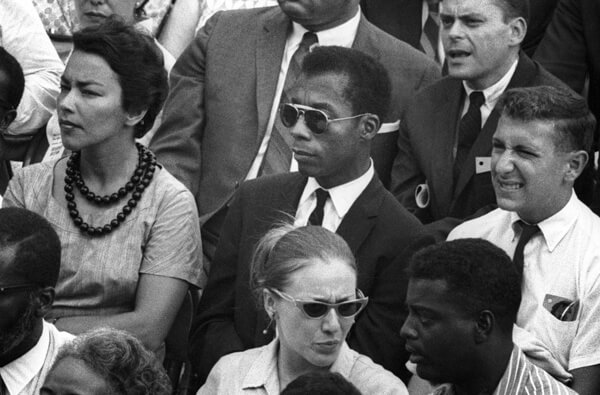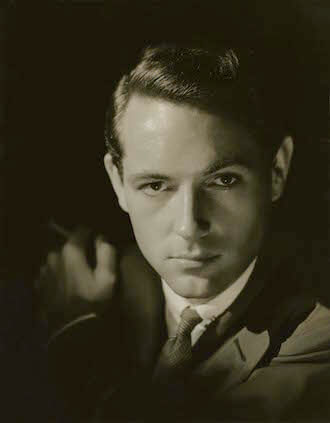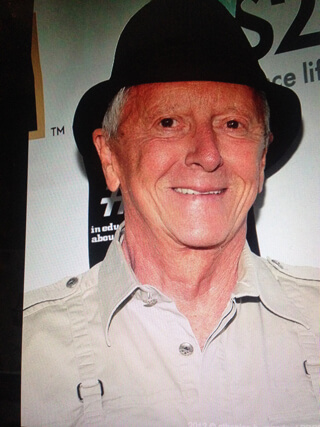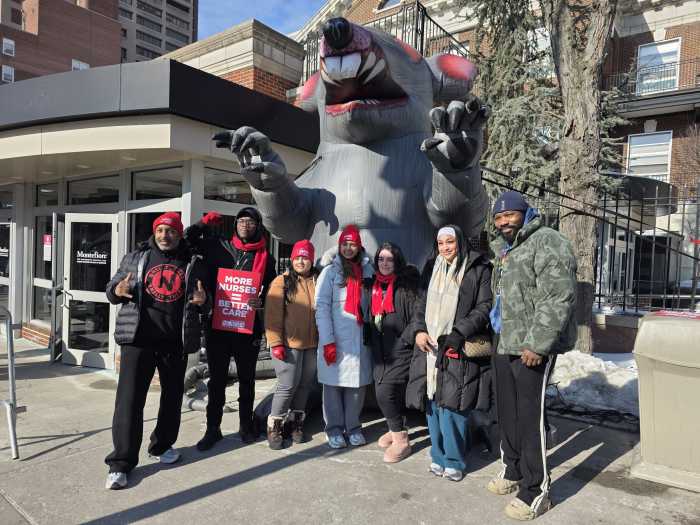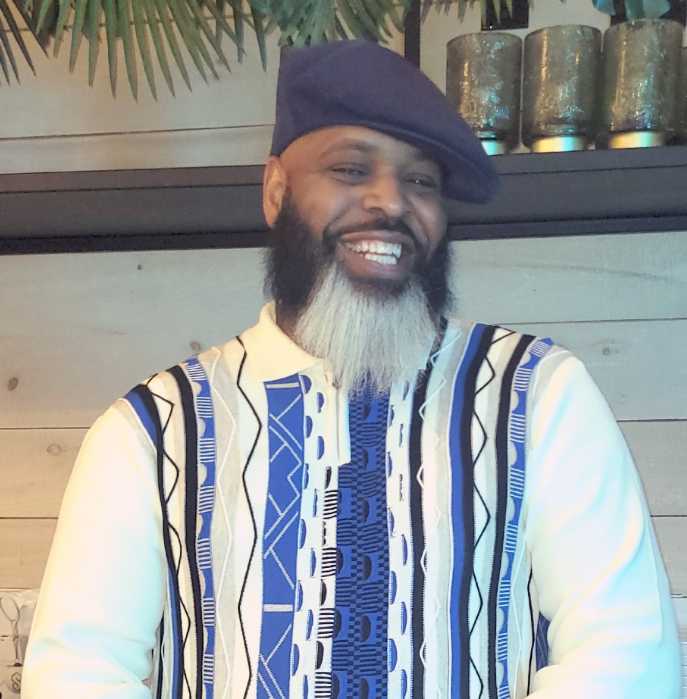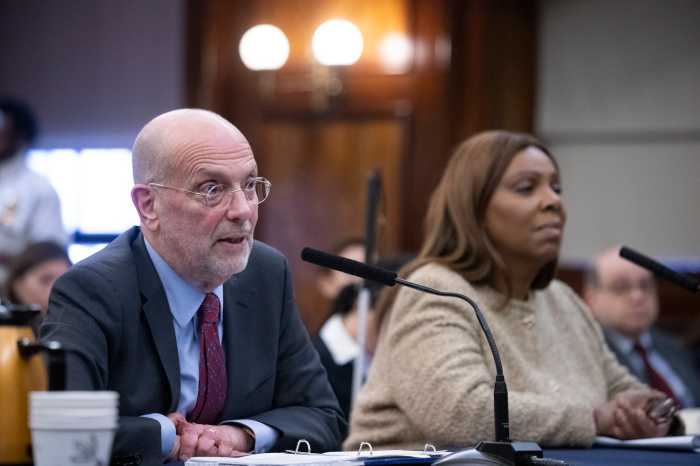Christina Noh doesn’t hold back. | TYLER GOMES
Appropriate for Mother’s Day, Christina Crawford blew into town with her show, “Surviving Mommie Dearest” at the Snapple Theater, and it was a must for anyone obsessed with her harrowing story, her formidable adoptive superstar mom, Joan Crawford, Hollywood in its so-called Golden Age, or that infamous camp cult favorite movie with Faye Dunaway.
There are, of course, also the serious issues of abuse and bullying she has made her lifelong crusade.
The centerpiece of her show was a 72-minute documentary that outlined her life, from her not-so privileged Hollywood childhood through her career as an actress, two marriages, a near-fatal 1981 stroke, and her recovery and move to the Northwest. She has hosted her own TV show, run a bed and breakfast, and become an Idaho county commissioner and founder of the Benewah Human Rights Coalition.
Christina comes clean again; Drama Desk hopefuls Osnes and Settle
During the Q&A period that followed the film, someone asked if she had experienced even one happy moment with her adoptive mother. Crawford said that while she may have as a very little baby, the one emotion that possessed her whenever they were together was fear. That was then, however. Today, nothing holds her back from revealing how beyond cruel Joan was to her and her beloved brother, Christopher — who Mommie Dearest once tried to ensure would never be able to enter the country again. Showing some stills I’ve always found a tad suspect, Christina backed up the rumor that before Hollywood beckoned Joan had appeared in nudie stag films. She even went so far as to conjecture that the sudden death of Alfred Steele, Joan’s fourth husband, in 1959 may have come about as the result of one of her drunken rages.
I grabbed the opportunity to interview her and soon realized that, even though she was no blood relation to Joan, she definitely inherited her steely survivor’s determination and unbendable will. It’s fascinating to me, the relation that children have with their star parents — which can vary from Lorna Luft’s resigned acceptance of Judy Garland’s ubiquitous legacy to Maria Riva’s strangely vicarious appropriation of Marlene Dietrich’s life, both narcissistic and highly judgmental (along with a cruel and unseemly TMI reveal of her final, sad years in her biography), B.D. Hyman’s outright hostility toward her Mom Bette Davis (in her memoir, “My Mother’s Keeper”), and Tracee Ross’ bemused observation about constantly being asked about Mama Diana, “Welcome to my life!”
More than once, Christina repeated to me that “this is not about my mother, it’s about me,” and she refused to even so much as take a look at the rare candid photos I had brought with me to the interview. “I don’t do that, David,” she said. “I’m really glad you have them, but it’s not part of what I do.” So the interview was a tightrope walk, with an unseen but nevertheless oh-so present Joan in the room, like some huge-eyed, lipstick-smeared Tinseltown elephant.
Still, exceptions continually arose, like when I mentioned how she’s always been a friend to the gay community, and Christina volunteered, “But that’s how I was raised! There were always gay men in our house. [Movie star turned interior decorator] William Haines and his partner Jimmy Shields my mother called the ‘happiest marriage in Hollywood.’ In those days, you knew these things but just didn’t talk about them, very different from today. But they were all completely accepted into our home.”
I mentioned how her book (and the film of it, which she disdains) has been, in a way, a blessing to Joan, as it’s kept her alive — even for younger generations who often know nothing before Madonna — while most of her contemporaries are largely forgotten.
“Any interest in her would have made her happy,” Crawford said. “She has been mythologized, but the truth of the matter is in the last 15 years of her life this was not the case, and in the last five she was a compete recluse. She only wanted to be the star and when that was no longer possible on her own terms, she made some very poor choices to try and perpetuate that stardom which wasn’t there any more.”
Crawford didn’t mince words about the film of “Mommie Dearest”: “It makes me sad that it’s not a very good film. I had nothing to do with it, was never on the set so I have to take a hands-off attitude about it. Besides not being a very good movie constructurally, they changed the point of view from my book and, thirdly, the performance level is melodrama.
“Unfortunately, another case of Hollywood not being able to make a good movie out of a good book. It was 30 years ago, but it refuses to go away because they keep putting it on TV. It has gained cult status, but that’s only one demographic.”
When I mentioned that Faye Dunaway also doesn’t want to talk about it, she laughed, “Do you wonder why?”
I mentioned the flack the book received when it came out from some quarters, and Crawford responded, “People are in denial. Everybody knew what was going on and had guilty consciences, didn’t they? Although Helen Hayes, who was my godmother, was very supportive and, in her autobiography, she speaks very openly about it.”
Asked about her stroke, Crawford said, “Look at me now! I’m here and fine, but, at 42, that stroke took five years to recover from. From that point on, I was determined my life was going to take a different course.”
Talking about her human rights work, Crawford said, “Abuse and bullying can come from texting, parents, the workplace, sports, or politics. It’s abuse of power on many different levels, affecting one psychologically and physically — and both hurt equally. Fortunately, even in rural America, we’re making progress helping kids, as they grow, to start taking responsibility and saying, ‘No, this is not acceptable’ in their peer groups. Once you start that conversation, things begin to change because the bully is no longer the fear factor, getting everything their way”.
Crawford has never had children: “I would be terrified if anything that happened to me would resurface in my parenting.” Yet she feels that the indulgence of many parents today who “negotiate” with obstinate children “can also be harmful, when people don’t have boundaries and appropriate non-narcissistic attitudes. Parenting is tough and I wish we made it equally as difficult to be a parent as it is to get a driver’s license. We don’t even think that way yet. In Europe, they do.”
The reception for the Drama Desk nominees at the Essex Hotel on May 8 brought out a passel of gussied-up talent at an ungodly early hour, and I caught up with Annaleigh Ashford, who was the best thing about the disappointing “Kinky Boots.” Her delightfully daft, delayed timing and authentic Northampton accent made her every appearance smile-inducing, and she told me she researched her role “by looking at a lot of episodes of ‘Little Britain.’” Smart little cookie, this one, and just as sweet. She seemed absolutely thrilled to be recognized after 10 years of kicking around New York theaters.
Laura Osnes, also up for a Tony for “Cinderella,” told me, “I’m having a ball, no pun intended, but I love coming to work every day. The cast is one of the best, a funny, very close group, and the energy offstage is very lighthearted and super fun. We’re telling this great classic story, but with humor, charm, and wit, so I get the best of all worlds.
“There are days when the stage door action is insane, but I was actually expecting it to be more crazy. A lot of people have just sat through a two and a half hour show and are ready to go home. But the children come, so adorable in their Cinderella costumes and tiaras, and grown women in their tiaras, for that matter. We have the advantage of crossing demographics: the kids love the magic and the story and the adults love the humor and the wit.
“Ann Harada [as a stepsister] gives the standout performance, I think. She took a role that could have been looked over and really made something of it. She’s so talented and is the nicest, most generous person, with a busy career and a seven-year-old boy. I don’t know how she does it.”
Harada is originally from Hawaii, like Drama Desk nominee Keala Settle, who woke everybody up in “Hands on a Hardbody” with her searing, soulful voice. I had a riot with this “tita” (Hawaiian for “sister’) after a few champagnes, screaming at each other in pidgin English so loud people were moving away. “Oh, yeah,” she said, laughing, “they always do dat when I get together wit local peoples!”
When I asked Settle, who’s been in New York for a while, having also appeared in “Priscilla, Queen of the Desert,” how she did what I saw her do so phenomenally on stage, she said, “That’s just us! You know, back home in Hawaii, when we get together and jam. It just comes out like that, naturally, full-force, which maybe some people aren’t quite ready for.”
Then, in ritual inevitable among people from Hawaii, I asked Settle where she went to high school, and she said, “Kahuku!” She then sang me her entire, and quite touching, school song, which created even more shock among our onlookers. Later, on the street, I spotted her teetering a bit on her high heels and said, “Sistah, you need rubber slippers!” “I get ‘em in my purse!”
Contact David Noh at Inthenoh@aol.com, follow him on Facebook and Twitter @in_the_noh, and check out his blog at http://nohway.wordpress.com/.

